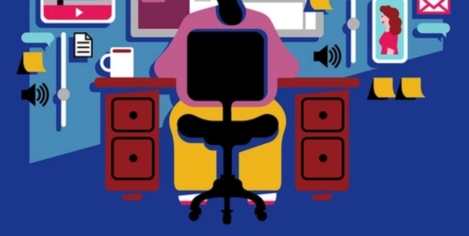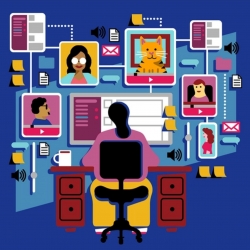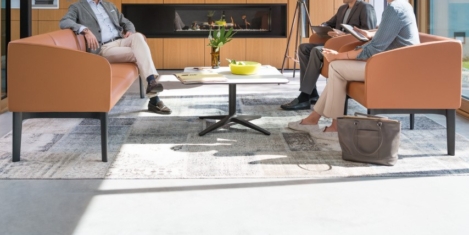January 7, 2022
The way we talk about hybrid working can reflect a failure of imagination
 The events of the last 18 months have given us a once in a generation opportunity to reinvent work. Our generation can create a discontinuity between the assumptions of the past and the opportunities of the future. To capitalise on these opportunities though we have to dispense with the assumptions we hold about work and the places where work takes place, including many of the assumptions we hold about hybrid working. We have to re-examine the purpose of the office and what form it might conceivably take in the future before we can decide if it has any place in our plans. (more…)
The events of the last 18 months have given us a once in a generation opportunity to reinvent work. Our generation can create a discontinuity between the assumptions of the past and the opportunities of the future. To capitalise on these opportunities though we have to dispense with the assumptions we hold about work and the places where work takes place, including many of the assumptions we hold about hybrid working. We have to re-examine the purpose of the office and what form it might conceivably take in the future before we can decide if it has any place in our plans. (more…)









 After nearly two turbulent years, which for many knowledge workers have been dominated by a ground-hog day like existence, people are looking for change. This is only natural as workers around the world are re-evaluating their priorities, reigniting their passions, or simply looking for something new. This has led to a mini-exodus from businesses, which is now being dubbed the ‘
After nearly two turbulent years, which for many knowledge workers have been dominated by a ground-hog day like existence, people are looking for change. This is only natural as workers around the world are re-evaluating their priorities, reigniting their passions, or simply looking for something new. This has led to a mini-exodus from businesses, which is now being dubbed the ‘
 That’s right. A New Year and still
That’s right. A New Year and still 
 Keeping on top of communication barriers in the business world can feel like an endless game of Whac-A-Mole, especially now in the new era of hybrid working. The usual culprits are well-known by now: patchy WiFi connections, crashing computer programmes, cloud syncing issues, important emails sneaking into spam folders – the list goes on. All can impede our ability to get the job done.
Keeping on top of communication barriers in the business world can feel like an endless game of Whac-A-Mole, especially now in the new era of hybrid working. The usual culprits are well-known by now: patchy WiFi connections, crashing computer programmes, cloud syncing issues, important emails sneaking into spam folders – the list goes on. All can impede our ability to get the job done. 
 The UK’s workforce is undergoing rapid transformation as employees’ expectations and motivations radically change. The impact of Brexit, COVID-19 and long periods of furlough have created a tidal wave of resignations across every industry. Workers are re-thinking career paths, work conditions and long-term goals after a turbulent 18 months; with one study finding that
The UK’s workforce is undergoing rapid transformation as employees’ expectations and motivations radically change. The impact of Brexit, COVID-19 and long periods of furlough have created a tidal wave of resignations across every industry. Workers are re-thinking career paths, work conditions and long-term goals after a turbulent 18 months; with one study finding that 


 Sustainability has been steadily moving up the business agenda over the past few years, with
Sustainability has been steadily moving up the business agenda over the past few years, with 
 World Menopause Day is held each year on 18 October and its purpose is “to raise awareness of the menopause and the support options available for improving health and wellbeing” according to the
World Menopause Day is held each year on 18 October and its purpose is “to raise awareness of the menopause and the support options available for improving health and wellbeing” according to the 
 One leadership characteristic that I believe should be prioritised above all others is compassion because every day I see that the world could benefit from kinder leaders. All other leadership qualities are interconnected with compassion. If we are to feel and demonstrate compassion, it is imperative to have a deeper understanding of connectivity with others and how to develop as a compassionate leader.
One leadership characteristic that I believe should be prioritised above all others is compassion because every day I see that the world could benefit from kinder leaders. All other leadership qualities are interconnected with compassion. If we are to feel and demonstrate compassion, it is imperative to have a deeper understanding of connectivity with others and how to develop as a compassionate leader. 
 There are 38 ways to win an argument. That is according to the 19th Century German philosopher Arthur Schopenhauer who laid them out in an essay called
There are 38 ways to win an argument. That is according to the 19th Century German philosopher Arthur Schopenhauer who laid them out in an essay called 
 Whilst driving through Zürich in a hailstorm I passed a Mercedes with a plastic bin liner taped over a missing window. Two thoughts struck me. First: this must be the result of the owner locking himself out of the car, as car crime is a fictional event in Switzerland (bike theft is preferred). The second was how utterly pointless this flapping piece of plastic served as an attempt to seal the broken window.
Whilst driving through Zürich in a hailstorm I passed a Mercedes with a plastic bin liner taped over a missing window. Two thoughts struck me. First: this must be the result of the owner locking himself out of the car, as car crime is a fictional event in Switzerland (bike theft is preferred). The second was how utterly pointless this flapping piece of plastic served as an attempt to seal the broken window. 








January 11, 2022
Great Resignation offers firms a chance to create the Great Retention
by Erin Eatough • Comment, Flexible working, Wellbeing, Working culture